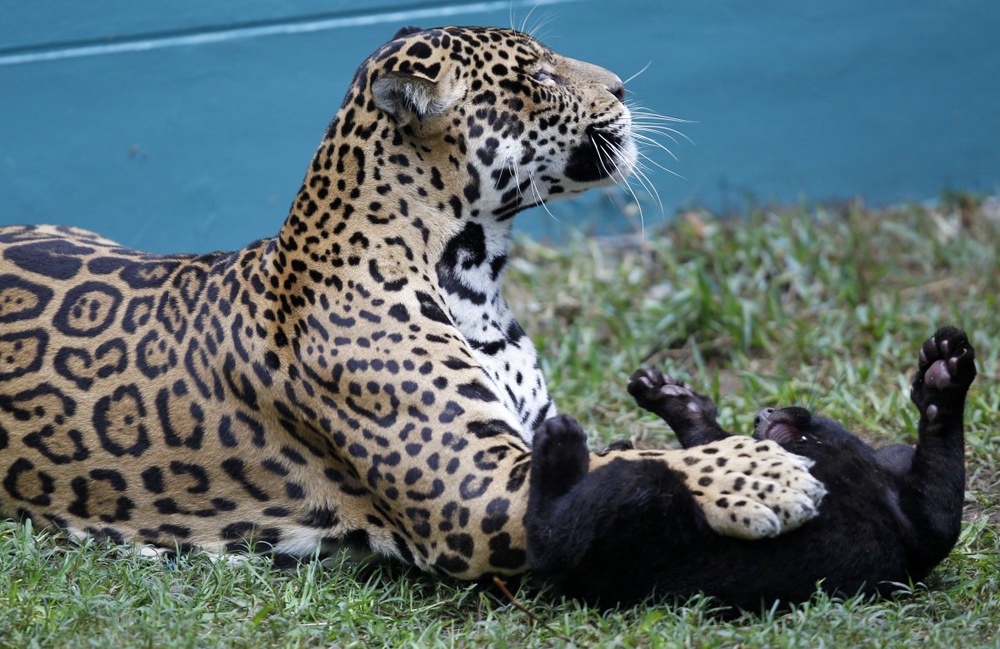
The jaguar could soon become extinct in Brazil's tropical Atlantic forest, threatening the shrinking primitive forest itself, AFP reports according to the Brazilian scientists. A study by the Brazilian conservation authority Cenap indicated the adult jaguar population in the region may have fallen to just 250, "an 80 percent slide over the past 15 years." And just a fifth of the remaining jaguars are of reproductive age, the study asserted. The 'Mata Atlantica' or Atlantic forest ecosystem, home to unique species and comprising a variety of tropical forest habitats, has itself lost more than 90 percent of its original volume over the centuries. It once made up more than 1.2 million square kilometers (463,300 square miles) -- roughly 25 percent of the Amazon region and around 15 percent of Brazilian territory. But deforestation, ranching and increased urbanization have seen that shrink to just 28,600 square kilometers, according to the SOS Mata Atlantica Foundation. The habitat loss puts pressure on the jaguars both in terms of seeking food sources and from hunting. Agricultural workers will, for example, not hesitate to kill a jaguar if it has eaten a cow, biologist Pedro Galetti told Folha. Yet with the jaguar at the top of the region's food chain, its slumping numbers pose a clear threat to forest biodiversity, warned Cenap head Ronaldo Morato. Morato told the Folha de Sao Paulo daily the jaguar's disappearance would cause major environmental imbalance and "the prompt demise of the Atlantic forest." Cenap will next week embark upon new research to monitor the remaining jaguars using satellite imaging to track their movements. Given widespread alarm at the decline of the forest, the United Nations Educational, Scientific and Cultural Organization conferred world heritage status on the region in 1999.





The jaguar could soon become extinct in Brazil's tropical Atlantic forest, threatening the shrinking primitive forest itself, AFP reports according to the Brazilian scientists.
A study by the Brazilian conservation authority Cenap indicated the adult jaguar population in the region may have fallen to just 250, "an 80 percent slide over the past 15 years."
And just a fifth of the remaining jaguars are of reproductive age, the study asserted.
The 'Mata Atlantica' or Atlantic forest ecosystem, home to unique species and comprising a variety of tropical forest habitats, has itself lost more than 90 percent of its original volume over the centuries.
It once made up more than 1.2 million square kilometers (463,300 square miles) -- roughly 25 percent of the Amazon region and around 15 percent of Brazilian territory.
But deforestation, ranching and increased urbanization have seen that shrink to just 28,600 square kilometers, according to the SOS Mata Atlantica Foundation.
The habitat loss puts pressure on the jaguars both in terms of seeking food sources and from hunting. Agricultural workers will, for example, not hesitate to kill a jaguar if it has eaten a cow, biologist Pedro Galetti told Folha.
Yet with the jaguar at the top of the region's food chain, its slumping numbers pose a clear threat to forest biodiversity, warned Cenap head Ronaldo Morato.
Morato told the Folha de Sao Paulo daily the jaguar's disappearance would cause major environmental imbalance and "the prompt demise of the Atlantic forest."
Cenap will next week embark upon new research to monitor the remaining jaguars using satellite imaging to track their movements.
Given widespread alarm at the decline of the forest, the United Nations Educational, Scientific and Cultural Organization conferred world heritage status on the region in 1999.

 +7 (777) 001 44 99
+7 (777) 001 44 99















































